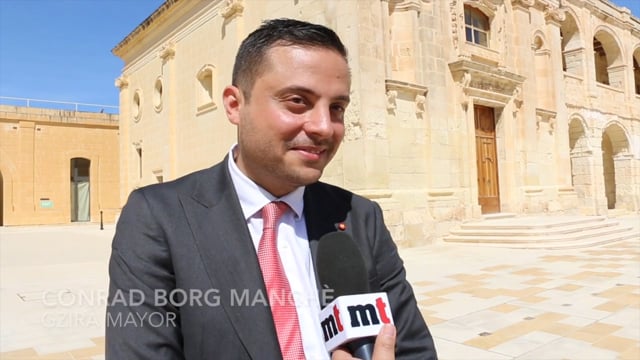[WATCH] Updated | Gzira council and MIDI sign Manoel Island guardianship agreement
The administrators of the foundation will comprise Gzira mayor Conrad Borg Manché, councillor Ralph Mangion, environmental activist Claire Bonello, and MIDI chief executive officer Mark Portelli


An agreement between MIDI plc and the Gzira local council for the guardianship of Manoel Island - unthinkable a year ago – was only possible because of the goodwill of all parties involved, Prime Minister Joseph Muscat said this morning.
The Gzira local council today signed an agreement for the guardianship of Manoel Island together with leaseholders MIDI, the developers of Tigné Point.
The deal follows a popular action by the local council and Moviment Graffitti as well as other environmental activists who sought public access to the Manoel Island foreshore.
Muscat, who was presiding over the signing, said that given the impasse between the developer and the local council, the government could have chosen not to do anything, to stand back and insist there was nothing it could do.
Video is unavailable at this time.
“But we realised there was goodwill on both sides,” he said. “I realised the council and mayor were not in this fight to garner votes , nor was the developer and investor intent on shutting out the community.”
He said this model should also serve well in other instances where economic interest conflicted with traditional, cultural and environmental issues.
Muscat said that because of the agreement, Manoel Island would truly become a landmark destination for locals and tourists alike.
MIDI, he said, had demonstrated they were not looking at the short term and seeking to make a quick buck, but had shown they were interested in a long-term fruitful presence in the community.
The guardianship agreement signed today will see a newly-formed foundation appointed as a guardian to see that public enjoyment of a good part of Manoel Island would be ensured, together with other conditions such as the retention of the glacis as a public park which will not be commercialised or built over.
Certain uses and building heights are also the subject of the guardianshp agreement. For example, a casino will no longer be built on Manoel Island, while the Fort will not be a hotel but a mixed cultural and retail venue ensuring accessibility and viability of the area.
Manoel Island will also retain its characteristic Mediterranean feel and building heights will be kept low.

The administrators of the foundation will not be remunerated, and will comprise Gzira mayor Conrad Borg Manché, councillor Ralph Mangion, environmental activist Claire Bonello, and MIDI chief executive officer Mark Portelli.
Bonello, the first chairperson of the foundation, said the agreement was proof that the perseverance of all parties involved had proven successful.
“It is proof that if all parties involved show enough goodwill, promising agreements can be reached,” she said.
Borg Manché said that the agreement was possible because the Gzira citizens had embarked on a campaign of dialogue with MIDI instead of one of antagonism.
He thanked Kamp Emergenza Ambjent in general and Andre Callus in particular for the hard work they did and the continuous support for the council’s position.

Borg Manché recently welcomed the revised masterplan for the Manoel Island project, which is now earmarking 80,000sq.m for a public park.
Borg Manché, who led a protest of Gzira residents against the closure of the Manoel Island coastline by developers MIDI, said the revised plans would turn the island into a cultural centre open to the public.
“We worked with MIDI and amended their proposals to create a more holistic island. We want Manoel Island to be Malta’s green island,” Borg Manché said.
MIDI faced public outcry back in March after publishing plans that included a hotel at Fort Manoel, an extensive shopping complex and a casino-hotel at the historic Lazaretto among other proposals. Speaking at the time, in response to the backlash, Prime Minister Joseph Muscat had said he wanted the island to be a “green lung”, insisting that he didn’t want the community to feel a stranger to the area.
Borg Manché, together with Kamp Emergenza Ambjent and Moviment Graffiti, later led a successful protest to forcibly reopen an illegally closed area that had kept the foreshore inaccessible to the public for 16 years.
“We fought for a greener plan for the area, hoping for the island to be an open space for the public. It is the only place of its kind we have left in Malta,” Borg Manché said.
Earlier this week, the MIDI group published a revised masterplan for the restoration and redevelopment of Manoel Island, which included a public park of over 80,000sq.m in area.
“In response to valuable feedback received from the broader community, the Gzira Local Council, and the NGOs, architects Foster + Partners significantly amended the earlier masterplan for Manoel Island,” MIDI said.






















